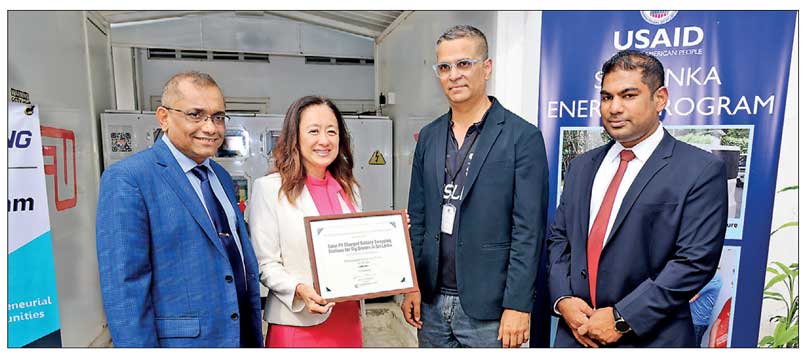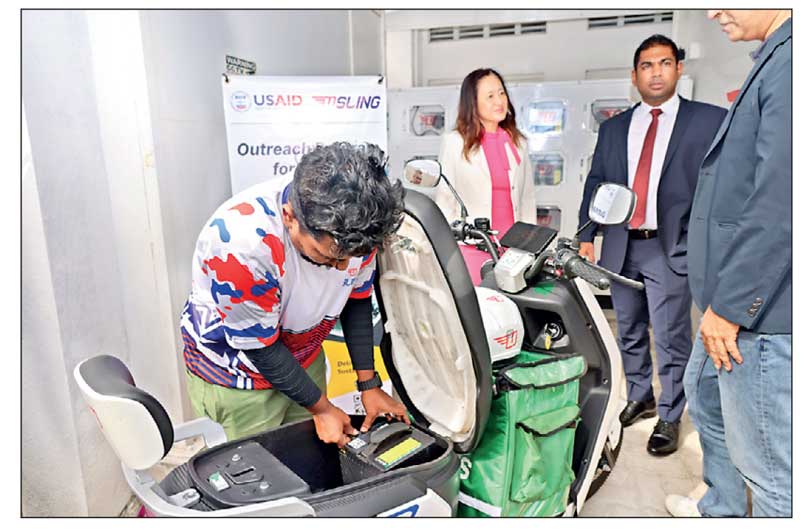Tuesday Feb 17, 2026
Tuesday Feb 17, 2026
Tuesday, 25 June 2024 00:02 - - {{hitsCtrl.values.hits}}

US Ambassador Julie Chung presents the Innovation Competition Award to Sling CEO Love Yadav and Sri Lanka Energy Project representative Kosala Gunawardana in a ceremony at the Centre for Women’s Research in Colombo. Minister Kanchana Wijesekera was also present at the event

US Ambassador Julie Chung witnesses the innovative solar-powered battery swapping station at the Centre for Women’s Research in Colombo. The station, part of the award-winning USAID-supported Sri Lanka Energy Project, not only promotes sustainable urban mobility but also provides a crucial income stream for the centre, empowering local women through research and community programs
Ground breaking solar-powered battery swapping stations recognised for their impact on sustainable urban mobility and economic development in Sri Lanka
The US Embassy recently announced Sri Lanka’s USAID-funded Sri Lanka Energy Project (SLEP) has received top honours at the 2024 annual conference for the Society for International Development, the premier US event for international development professionals.
The award was given in recognition of the innovative solar-powered electric vehicle battery swapping stations owned and operated by Sri Lanka’s Sling Mobility Ltd., particularly highlighting the station located at the Centre for Women’s Research in Colombo, which generates income to support the centre’s activities.
In a ceremony held at the Centre, US Ambassador Julie Chung and Power and Energy Minister Kanchana Wijesekera presented the Innovation Competition Award to representatives from SLEP and Sling Mobility. “It is inspiring to see this international honour come to Sri Lanka, especially since this is such a great example of innovation, renewable energy, private sector development, and women’s empowerment,” Ambassador Chung said, noting the project’s solar-powered battery swapping station at the women’s centre contributes to the centre’s income and supports sustainable urban mobility. “The United States is committed to our partnership with Sri Lanka to develop solutions that secure the country’s energy future, drive economic development, and lift all segments of society.”
This year’s conference “World in Crisis: Sparks of Hope” saw over 1,500 in-person and virtual attendees voting for innovative approaches to sustainable development. The USAID-supported SLING “360° Sustainable Mobility” project emerged as a standout, providing cost-effective and efficient solutions to the retail logistics sector through a smart electric vehicle ecosystem. This initiative significantly reduces the high initial costs of buying batteries and e-bikes by offering a battery subscription service. Collaborating with Uber for food delivery services, Sling Mobility has demonstrated the model’s effectiveness in reducing downtime for riders, thus saving both money and time.
“Sling Mobility’s collaboration with USAID marks a significant step towards a sustainable and green future for urban mobility in Sri Lanka,” said Sling CEO Love Yadav. “The “360° Sustainable Mobility” solar powered battery swapping project is not just a technological innovation but a testament to the transformative power of partnerships driving positive change and has a potential of sustained innovation in the energy sector beyond electric mobility.”
Additionally, USAID SLEP’s assistance also focuses on economically disadvantaged and marginalised populations, promoting their involvement in the retail logistics sector through electric vehicle use. In its first phase, the initiative trained 18 drivers, assisted 10 individuals in obtaining driver’s licenses, and conducted four outreach activities reaching over 100 participants.
The USAID Sri Lanka Energy Program is part of the broader US partnership with Sri Lankan people to promote a healthy, educated, and employed population. The program supports transforming Sri Lanka’s power sector into a market-based, secure, reliable, and sustainable system by mobilising investment to deploy advanced technologies, increase flexibility, and enhance competitiveness.